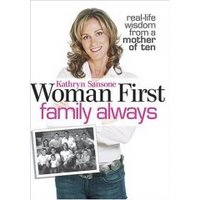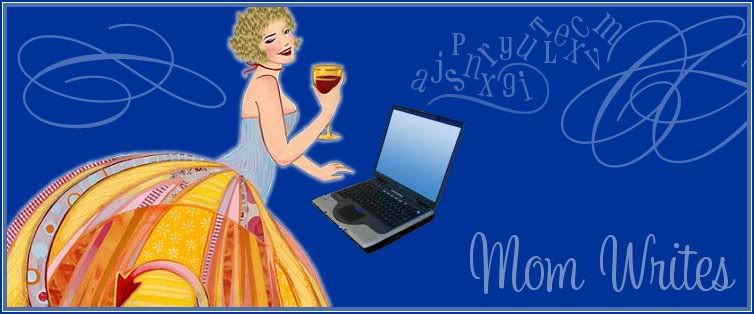Book review: Woman First, Family Always by Kathryn Sansone
 Woman First, Family Always
Woman First, Family AlwaysKathryn Sansone
Meredith Books, 2006; $24.95
I'll be honest with you. If I had walked into a bookstore and saw Kathryn Sansone's book Woman First, Family Always sitting on the table, I might have picked it up. I might have been attracted to the author's cover photo and her pretty hair, her bright smile, and her boyish hips. I might have been intrigued to peek inside after reading on the book's cover that it contained "real-life wisdom from a mother of ten."
But I don't go into many bookstores these days. Small children and shelves of books don't mix unless your goal is to remove the books from the shelves and put them on the floor. Instead of going to bookstores, I sit at home and blog about my tortured life as a mother of two small children. And for some reason, somebody involved with the marketing of Woman First, Family Always decided that I would be a likely candidate for reading and blogging about Sansone's book.
And so here I am.
Sansone's book was a non-challenging read. I've probably spent more time writing this review than I did reading her book. As a wife and mother of ten children, Sansone has some "simple words of wisdom" that she decided to share with the rest of us moms who are struggling to figure out this whole mothering thing.
Sansone has three core wisdoms:
- She is not supermom
- She is important as a woman first and then as a wife and a mother
- She must make time to nourish her spiritual center
She writes:
"A woman must be aware of herself and her own needs so she can be aware of the needs of her family. If you give too much of yourself away in the process of being a parent, you'll probably end up feeling stressed and resentful."
In the world according to Sansone, to nurture ourselves we should avoid "people who live in a cloud of negative energy," "stay positive one day at a time," and "be a strong woman with a soft heart." To nurture our marriage, we should "encourage growth and independence," weed out seeds of distrust," and "stay sexy" in our minds and bodies. To raise happy and healthy kids, we should "organize their physical space," "create bedtime routines," and "set up a healthy food attitude."
Woman First, Family Always is filled with impersonal anecdotal evidence Sansone uses to illustrate her suggestions for taking care of self, marriage, and kids. If she writes about her children, she does not refer to them by name. Maybe that's because there are too many for the reader to keep track of, but a personal story loses something in the telling when one of the characters is named "baby number one."
While some of Sansone's advice is good, some is just plain impractical. I found myself wondering if she follows her own advice. For example, she suggests leaving a big bowl of cut fruit (strawberries, blueberries, raspberries, bananas, oranges, and pinapple) out on the counter for kids to snack on throughout the day. How does a woman with ten children who works out daily and who is writing a book also find the time to cut gigantic bowls of fresh fruit every day?
Sansone never fully reveals how she does it all and that's too bad. I felt her book lacked the actual real-life wisdom that it takes to stay sane and sexy after giving birth ten times. As I read through her book, I kept coming back to her picture and to the pictures of her kids. Is she really this happy? Is her life really this simple? Are her beliefs and actions really this cut and dried? And what about her kids? Can they possibly be getting enough attention in a family of ten?
In general, Sansone's wisdoms tend towards the simplistic and the superficial and they don't take into account the complexities of human nature, either our own or other people's. I worry that Sansone--who claims she is not a supermom--is inadvertantly setting women up to feel like they themselves are failures because they don't do a fraction of what she does and they have far fewer kids.
It's possible that Sansone didn't mean to take complex ideas and turn them simple. Maybe for her, life is less complicated and more straightforward than it is for the rest of us. I have often wondered how women with big families do it. After reading Sansone's book, I still wonder. If I took Sansone's advice at face value, I would be left believing that women who are doing it and doing it well--as Sansone seems to be--are simple creatures. For Sansone, life is like a light switch: on or off. If you subscribe or want to subscribe to the "just do it" theories of internal happiness, marital bliss, and raising children, let me know and I'll send you my copy of her book.
***
Technorati tags: book reviews, Kathryn Sansone









<< Home